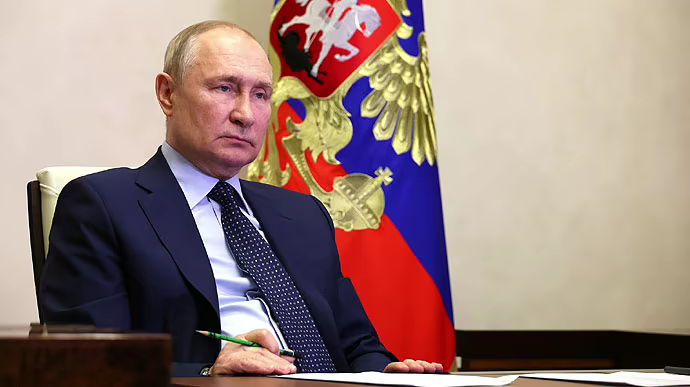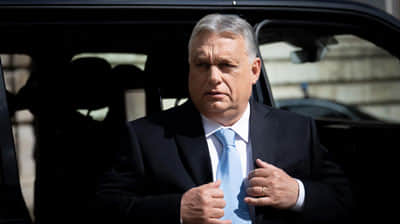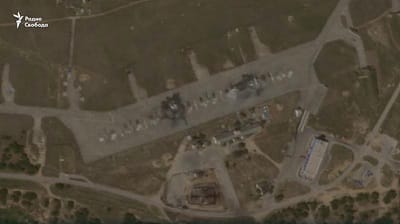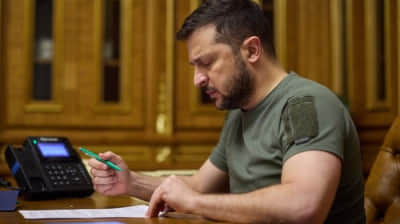ISW analyses Putin's statement about Russia's goals in war against Ukraine

Experts from the Institute for the Study of War (ISW) have analysed Putin's statements made during his press conference on 14 December.
Source: ISW
Details: Analysing Russian President Vladimir Putin's press conference, the ISW noted that the latter used the event to discuss his goals in Ukraine, specific operational and tactical situations on the front line, and the specific concerns of Russian conscripts and volunteer soldiers in a much more public and lengthy manner than in his previous statements about the war since the start of the full-scale invasion of Ukraine.
The experts say Putin's willingness to devote a significant portion of his speech to the war in Ukraine reflects his growing confidence in addressing the Russian public on this issue, which in turn may reflect his confidence in Russia's prospects in Ukraine following the relatively successful Russian defensive operations in western part of Zaporizhzhia Oblast and what is seen as wavering support for Ukraine from the West.
Putin did not propose a new approach to the war, nor did he describe how Russia intends to achieve victory in Ukraine, nor did he specify what a Russian victory would look like.
Quote: "Putin’s statements on 14 December are similar to the boilerplate claims about the Russian war in Ukraine that he made during a speech at a Russian Ministry of Defence (MoD) Collegium meeting almost a year ago, for example."
"Putin has not described what change to the Ukrainian Armed Forces would constitute ‘demilitarisation’, although Russia’s goal is almost certainly to strip Ukraine of the means to defend itself and allow Russia to impose its will upon Ukraine through force whenever the Kremlin so chooses."
More details: Putin’s calls for Ukrainian "neutrality" are demands that Ukraine amend its constitution, which currently binds Ukraine to seek NATO membership, and pledge not to join NATO or the European Union.
These are part of a longer list of broader Russian goals beyond Ukraine, which include a permanent moratorium on NATO expansion, a ban on Western strike weapons being deployed near Russia, and a de facto return of NATO forces to 1997 levels.
Putin reiterated his unwillingness to engage in negotiations with Ukraine and stated that peace will only come when Russia achieves its maximalist goals.
The ISW continues to assess that Putin's maximalist goals amount to the complete surrender of Ukraine and the West. These maximalist goals are also not in the interests of Ukraine and the West.
Furthermore, Putin stated that the grouping of Russian troops in Ukraine is much larger than even Russian officials admit, likely in an attempt to simultaneously allay Russia's ongoing fears of a new wave of mobilisation and demoralise the West and Ukraine.
To quote the ISW’s Key Takeaways on 14 December:
- Russian President Vladimir Putin displayed notable confidence in publicly discussing Russia’s war on Ukraine during a joint event combining his annual press conference and "Direct Line" forum on 14 December but did not clearly define his envisioned end state for the full-scale invasion he launched on 24 February 2022.
- Putin reiterated his maximalist objectives for the Russian war in Ukraine.
- These maximalist objectives also do not exclude Russia’s annexation of occupied Ukrainian territories or additional territorial conquests.
- Putin attempted to rhetorically contextualise Russia's continued maximalist objectives in Ukraine within the wider conception of Russian "sovereignty," an ideological line that has been consistent in the Kremlin's framing of Russian national security and foreign policy since before the full-scale invasion of Ukraine.
- Putin claimed that the Russian force grouping in Ukraine is far larger than even Russian officials have characterised, likely in an attempt to both address persistent Russian concerns about a new mobilisation wave and to demoralise the West and Ukraine.
- The difference in the reported numbers of Russian personnel involved in the war is likely due to different categorisations of Russian military personnel and does not reflect a significant increase in Russian personnel on the frontline, which Ukrainian forces have consistently been repelling.
- Putin notably addressed the tactical and operational situation in east (left) bank Kherson Oblast but refrained from discussing active Russian offensive operations in eastern Ukraine.
- Putin’s public discussions about issues at the front and about the Russian war effort in general may redirect public anger about problems in the war toward the Russian Ministry of Defence (MoD).
- Putin also attempted to convince the Russian public that the Russian economy is resilient in the face of international sanctions and the fallout of the war in Ukraine.
- Putin continued to express an increasingly anti-Israel position on the Israel-Hamas war, likely signalling a continuing decline in Russian-Israeli relations.
- Putin attempted to downplay deteriorating Armenian-Russian relations and extricate Russian peacekeeping forces from any responsibility for Armenia’s loss of Nagorno-Karabakh as Armenia appears to be effectively abstaining from participating in the Russian-led Collective Security Treaty Organisation (CSTO).
- Russian forces continued offensive operations along the Kupiansk-Svatove-Kreminna line, near Bakhmut, near Avdiivka, west and southwest of Donetsk City, in the Donetsk-Zaporizhzhia Oblast border area, and in western Zaporizhzhia Oblast and advanced in some areas.
Support UP or become our patron!







